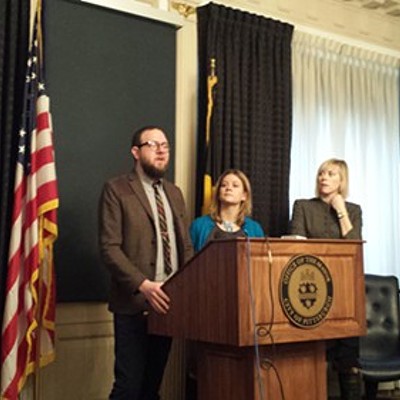Tuesday, January 14, 2014
Gross introduces land bank legislation
Thousands of vacant, blighted and abandoned properties in Pittsburgh would be acquired and redeveloped or sold under legislation introduced this morning by District 7 city councilor Deb Gross.
The legislation calls for the creation of a Pittsburgh land bank, which would operate as a repository for properties that often have little prospect of redevelopment, costing the city millions and bringing down the value of surrounding property.
"The legislation allows us to stabilize our housing infrastructure," Gross says. "It's basically a tool for neighborhoods to rebuild."
Properties in the land bank can be used for everything form community projects like urban gardens or green spaces to private developments and side yards.
“Mayor Peduto has said on numerous occasions that he’s very supportive of land-banking," says Liz Hersh, executive director of the Housing Alliance of Pennsylvania. "The community has done a lot of work on what a land bank might look like.”
Although Pittsburgh already has a role in property redevelopment, the process is often time consuming and cumbersome for developers or community organizations who must negotiate existing tax liabilities and potentially conflicting property ownership claims.
In the context of a land bank, those liabilities and claims of ownership have already been dissolved, creating a single entity separate from the city responsible for helping communities put blighted and abandoned land back to use.
Gross' bill comes just a day after Philadelphia mayor Michael Nutter signed legislation authorizing what will likely become the largest city to have a land bank.
That's no coincidence; Philadelphia's legislation served as a model. Pennsylvania land banks were authorized under state legislation enacted late in 2012.
“Prior to this law ... there really was no one who was authorized at the local level to look at blighted, vacant or tax foreclosed property,” Hersh says. "It was essentially nobody’s job to create an inventory to get clear titles or to market those properties in a comprehensive way.”
Before the state authorizing legislation, the Pennsylvania tax code operated under a system that presumed a robust housing market.
“The tax sale system was invented in 1923 before people walked away from their properties,” Hersh says. There was no reason to think a property wouldn't quickly be scooped up, which is partly how we ended up with a system where tax delinquent properties can amass taxes for years — or decades — on end. But deindustrialization, population loss and the housing crisis is making law makers reconsider that philosophy.
“People were really asking themselves ‘what other tools and strategies can we use — to reuse or re-purpose these properties where people have walked away?'” says Kim Graziani, a vice president at the Washington, D.C. based Center for Community Progress.
Census data show there are 9,017 long-term abandoned properties in Pittsburgh, according Bob Gradeck, a project manager at the Pitt Center for Social and Urban Research. That's about 5.8 percent of all housing units. But if you include long-time tax-delinquent properties, the number jumps.
“Anywhere between 14 and 17 percent of properties fall into this ‘no one is paying the taxes, they've abandoned the physical responsibilities,'" Gradeck says. “You look at some neighborhoods where over 50 percent of properties are tax delinquent, and other [neighborhoods] that are under 5 percent.”
Graziani, who is the former director of neighborhood initiatives in Pittsburgh, explains the difference between redevelopment authorities (like the URA) and land banks.
"A land bank most times is more focused on the transformation of vacant, abandoned properties back into productive reuse," Graziani says. "And that isn't always a market-driven approach. Land banks can be about stabilization, not just economic development."
But land banks have other tools, too. They can exercise a 'trump bid' at treasurer's sale, acquiring property without being the highest bidder. It can also exercise an expedited title-clearing process, meaning ownership conflicts are already dealt with.
Unlike the URA, though, the land bank wouldn't have the power of eminent domain (though the URA is allowed to transfer property to the land bank).
Gross' legislation would create a legally distinct entity governed by a seven member board of directors (four members would be mayoral appointees, three would be council appointees).
The board is required to use the bank's land in a way that is "consistent with the provisions of the City's Comprehensive Plan and any adopted neighborhood plans in the area," but if there is no neighborhood plan, the land bank is required to consult "with any community groups in the area."
Many in the community development world see land banks as the way forward.
“It’s just sort of a tangled mess,” says Aggie Brose of the current system. She's the deputy director of the Bloomfield Garfield Corporation. The streamlined process of title clearing would help reduce the number of blighted properties, she says, noting "Developers aren't going to wait for us while we sit on our hands."
Still, it isn't entirely clear how the land bank will be funded; Gross' legislation doesn't create a funding stream. Though land banks can generate revenue by selling property and recapturing taxes, blighted and abandoned properties can be expensive to maintain — one of the reasons the city isn't interested in them in the first place.
The legislation also calls for at least two dedicated staff members, an added cost.
Gross says outside grants are a funding possibility along with selling property assets — and she didn't rule out support from the city.
And while the land bank has advantages, "It doesn't create markets," Hersh says. "It’s not like you’ll see overnight transformation.”
If the legislation passes, the land bank board is scheduled to be seated March 31.










